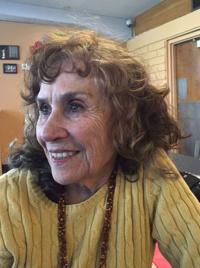Editor's note: Chicana playwright and writer Silviana Wood died Thursday, July 17, at her ┤¾¤¾APPhome at age 85.┬á
"She was a gifted and articulate teller of barrio life here," former ┤¾¤¾APP columnist Ernesto Portillo Jr. posted on Facebook.
In tribute, we are reprinting this piece that ran in Portillo's longtime column in the Star, Neto's Tucson, in March 2016; minor updates in tense have been made to reflect the passage of time. 
Memories of Barrio Anita infuse Wood's 'Dreams'
It took 10 years, but Silviana Wood finally got it.
The Barrio Anita native, who wrote plays for local Chicano thespian troupes, who has had her works staged in this country and Mexico, who earned a masterÔÇÖs of fine arts degree after 27 years, who created a memorable, wise-cracking character for stage and television, and who walked alongside supporters of farmworkers and barrio residents, finally got her book published, in 2016.┬á
People are also reading…
The decade of waiting ended that year when University of Arizona Press published ÔÇ£Barrio Dreams,ÔÇØ five of WoodÔÇÖs plays she has written over the years. The book was edited by Norma E. Cant├║ and Rita E. Urquijo-Ruiz, both professors of Latino studies and literature.
WoodÔÇÖs works, which have been included in several anthologies, reflect her life as a Chicana in Tucson. Her work follows the long, proud tradition of Chicano and Chicana playwrights who incorporate political commentary, social commentary on race relations, bilingual dialogue and ample use of Chicano slang or cal├│, a one-of-a kind barrio lingo. In one of her plays in her book, ÔÇ£Yo, Casimiro Flores,ÔÇØ she adds Yaqui to her Spanish and English.

Silviana Wood 
Another play in the book, ÔÇ£Amor de Hija,ÔÇØ (A DaughterÔÇÖs Love), a story of a four-generation family and dementia, was staged in San Antonio, Texas, in 1987, and ÔÇ£Anhelos por OaxacaÔÇØ (Yearnings for Oaxaca), about a retired railroad worker returning to his birthplace with his U.S.-born son, was presented in Mexico.
Her characters spring from her family and people she knew in the barrio, her fellow students at John Spring Junior High School, and activists with the United Farm Workers in California. Some are real, others are imaginary but not far from truth: Nana Cuquita, assorted comadres (BFFs) and chismosas (gossipers). ThereÔÇÖs Eddie Spaghetti, Tony Baloney and Ram├│n Jam├│n. And thereÔÇÖs Catungas, Watusi, Moonbeam, el Militante and, of course, the Mexican comedian Cantinflas, a comic source of inspiration for Wood.
Throughout her experiences, Wood made sure she listened.
ÔÇ£I love people and I love language,ÔÇØ said Wood, who met me at the restaurant at El Rio golf course a week before her family and friends gathered to celebrate her book.┬á┬á
ÔÇ£WeÔÇÖre recognizing her as an artist and giving her the props she deserves,ÔÇØ Mario Gonzales said back then, as one of WoodÔÇÖs peeps from Los Vatos de John Spring, an alumni group from the old junior high in the Dunbar Spring neighborhood, across the tracks from Barrio Anita, north of downtown. ÔÇ£WeÔÇÖre also recognizing one of our own.ÔÇØ
In many ways, the El Rio links are where Wood got her start as an activist and playwright. The late 1960s turned into the early ÔÇÖ70s, and many west-side residents were agitated. Long overlooked and underserved, barrio residents demanded improved municipal services and equity. One focal point was the El Rio golf course, which many wanted turned into a large park.
Wood and her brothers were part of the protests, which she channeled into her artistic work. She became part of Teatro del Pueblo which led to Teatro Libertad and Teatro Chicano, local grass-roots groups that performed on the streets, in parks, in union halls. At Pima Community College she began writing Chicano-centered plays because there were so few.
It was from her work with Teatro Libertad that Wood created one of her most memorable characters: Do├▒a Chona, the glib barrio neighbor with the crazy wigs who dishes out advice, admonishments and mitote (gossip) freely. Do├▒a Chona also appeared regularly on KUATÔÇÖs ÔÇ£ReflexionesÔÇØ bilingual television program and was resurrected for a short time on the local Telemundo TV station.
When Wood began writing in the ÔÇÖ70s, there were few Chicano or Chicana playwrights. Even the small number of plays that were written seldom found a stage.
She was a pioneer who refused to step away and give up.
Waiting for 10 years was worth it.





